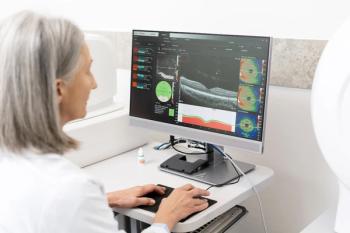
AI Optics’ Sentinel Camera gains FDA 510(k) clearance
The Sentinel Camera aims to address critical gaps in retinal disease screening by offering a portable device that captures high-quality images that require no dilation of the eye.
AI Optics, an AI-focused medical device company, has received FDA 510(k) clearance for its Sentinel Camera, a handheld retinal imaging system.
The Sentinel Camera aims to address critical gaps in retinal disease screening by offering a portable device that captures high-quality images that require no dilation of the eye. According to the company, this eliminates the need for some patients to visit an eye specialist’s office. Additionally, the Sentinel Camera supports DICOM-compliant image formats, allowing integration with Electronic Health Record (EHR) systems.
"The fact that this device provides truly immediate results is a massive differentiator," Matthew Alpert, OD, president of TEC Eye Consortium, told AI Optics.2 "No busy clinician has the time to wait for results. On top of that, it introduces an incremental revenue stream, differentiates your practice, and improves HEDIS scores.”
Luke Moretti, co-founder and CEO of AI Optics, commented on the device and clearance in a press release from the company.
"Our vision with the Sentinel Camera is to eliminate barriers to retinal screening and ensure that every patient who needs screening has access," said Moretti "This FDA clearance not only validates our significant progress to breaking down screening barriers but also sets the stage for our future AI-powered screening solutions, which will integrate seamlessly with the Sentinel Camera to deliver unparalleled accessibility and efficiency in retinal disease detection."
In addition to the clearance, AI Optics is developing AI-based retinal screening software for future integration. The company aims to provide a comprehensive end-to-end solution for detecting retinal diseases such as diabetic retinopathy, glaucoma, and macular degeneration.
AI Optics is also collaborating with NYU Langone Health with the goal of advancing the accessibility and implementation of retinal screening technology. According to the company, this clearance “marks a pivotal step in this journey, enabling the integration of high-quality, portable imaging into diverse healthcare environments.”
References:
- AI Optics Receives FDA Clearance, Increasing Patient Access to Retinal Screening. Press Release. Published January 28, 2025. Accessed January 28, 2025.
https://investors.apellis.com/news-releases/news-release-details/apellis-receives-approval-syfovrer-pegcetacoplan-australia - AI-powered retinal screening for optometry practices. AI Optics. Accessed February 6, 2025. https://www.aioptics.ai/optometry
Newsletter
Want more insights like this? Subscribe to Optometry Times and get clinical pearls and practice tips delivered straight to your inbox.




























